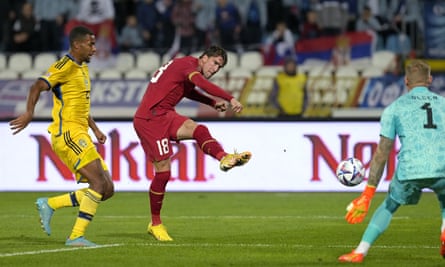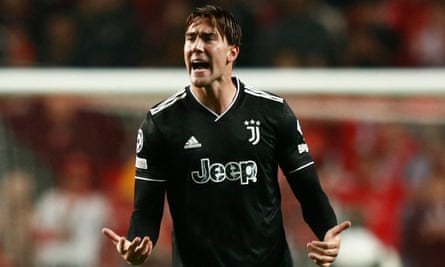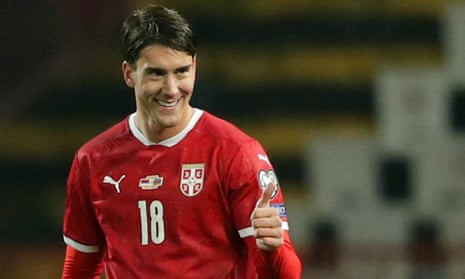Milan Ristic knew what to do when it seemed Dusan Vlahovic could be about to slip through the cracks. The striker was 14 years old but his gifts were legendary on Serbia’s youth football scene and, increasingly, well beyond. Partizan Belgrade had been trying to sign him upon his graduation from Altina Zemun, a local academy, but could not reach a deal with the player’s family.
Next, Vlahovic had been taken to nearby OFK, where a brief spell ended in disagreement. Shortly afterwards Ristic, a youth coach at Partizan, heard Vlahovic had been spotted kicking a ball around alone at his local stadium. The boy needed to play, not for his talent to be squandered while adults wrangled around him. Ristic jumped straight in the car with his colleague, the influential talent developer Dusan Trbojevic, and drove fast.
Quick GuideQatar: beyond the football
Show

It was a World Cup like no other. For the last 12 years the Guardian has been reporting on the issues surrounding Qatar 2022, from corruption and human rights abuses to the treatment of migrant workers and discriminatory laws. The best of our journalism is gathered on our dedicated Qatar: Beyond the Football home page for those who want to go deeper into the issues beyond the pitch.
Guardian reporting goes far beyond what happens on the pitch. Support our investigative journalism today.
“I’ve seen and worked with many players,” Ristic says. “But he was the only one who I could tell, on first sight, was ultra-talented. Some kids are taller, faster, stronger, but only with Duci could I say immediately that he would be a great player.”
It was why the boy needed a good home. The high-speed journey was not in vain: this time everyone shook hands and Vlahovic’s budding career was back on track.
Since then it has ignited and the thrill for Serbia, who begin their World Cup against Brazil on Thursday, is that they have a genuinely top-class striker in their ranks. Vlahovic was the hottest name in Europe last winter, moving to Juventus from Fiorentina in January, and his form has held up even during a period of relative instability for the Bianconeri.
He is a born goalscorer and, more than that, a multifaceted leader of the line. It is hard to believe he is 22 but it is not outlandish to think that, should he stay fit and healthy over the next few weeks, his team have a fighting chance of breaking new ground. “I can’t remember the last time our side looked so good and full of confidence,” says Sava Petrov, who played alongside Vlahovic in that feted Partizan youth setup.

Petrov, who is two years Vlahovic’s senior and plays for Radnicki Nis, remembers when the excited whispers turned into loud, confident proclamations. It was after Vlahovic, playing for the Partizan under-15 side coached by Ristic, scored four goals against bitter rivals Crvena Zvezda – Red Star – despite missing a penalty. “That is when people started speaking his name widely,” he says. “Everyone could see there was something that set him apart from others of his generation.”
It had long been apparent at Altina, who work with boys aged between seven and 14, and whose youth sides would constantly punch above their weight. Vlahovic tended to play up an age group but that did not stop him carrying the fight. Dragan Perisic, his coach there, recalls a match at Crvena Zvezda when his team talk was in effect done for him. “Before the match he gathered our players together and told them: ‘Let’s win, don’t be afraid, we’re a good side and we can beat them.’”
Altina’s underdogs beat the country’s biggest name 1-0. “He loves the matches against strong rivals, he enjoys it when it is tense,” Perisic says. “When you are a good guy and a quality player then others in the team will respect you a lot. “He had that and knew how to use it to make our team better. He never looked for excuses when things weren’t good. He’s not a phoney.
“There was never a single argument with a teammate: even when he wasn’t scoring he wouldn’t get nervous or yell at others. And when he saw a teammate struggling to score he would pass him the ball, trying to motivate him to overcome the problem. I liked that a lot.”
Ristic credits Vlahovic as being “the biggest professional I’ve ever seen … his work ethic outstrips his talent”. He describes Vlahovic, who tried out once for Crvena Zvezda before joining Partizan but failed to impress on the day, as a typical Zemunac from Belgrade’s north-western suburbs. “They don’t say without a reason that guys from Zemun are tough,” he says. “When people from there have something planned, they don’t give up until they achieve it, whether that’s in sport or in life.”
Shortly before Vlahovic joined Partizan, Perisic travelled to Italy for a fact-finding mission at Torino. He was surprised to find himself fielding questions about his protege: the club’s scouts, as aware as anyone that Serbia’s wealth of young talent is astonishing for its size, had been monitoring him in his early teens. They had the right idea but, eight years on, Vlahovic has bypassed them by moving to their city’s giants.
Europe’s biggest clubs watched as Vlahovic became Partizan’s youngest-ever professional and was handed the No 9 shirt a month after turning 16. He had scored his first senior goal within weeks but would manage only three before Fiorentina pounced. The months between his signing a preliminary contract, formalised in June 2017 before kicking in on his 18th birthday the following February, and arriving in Tuscany were dogged by injury and an understandable fidgetiness.
after newsletter promotion
Even more frustratingly, he could not be registered to play until July 2018. “It was a hard period for him, his head was in Italy and body in Belgrade,” says Petrov, with whom Vlahovic had by now played for Serbia’s under-19s. Ristic says: “He didn’t take that well. Basically he lost a whole year and he is the type of player who always wants to play.”

Any lost time has long since been made up for. Vlahovic scored 44 times in the Italian top flight for La Viola, was named its best young player in 2020-21 and has kept his head above Juve’s stormy waters with better than a goal every other game. He admires Cristiano Ronaldo and Zlatan Ibrahimovic: nobody could say he is there yet but there are elements of both in his 6ft 3in frame, touch, power and the variation of his finishing.
At Altina, Perisic was keen to entrust Vlahovic with his side’s No 10 shirt. It was meant as a reward for his performances and preternatural leadership skills: the coach considered it the most significant in football. He relayed the offer to his player but, later that night, received a phone call from the club president, Nebojsa Pejovic. Vlahovic had asked whether he could keep the No 9 shirt he had previously worn. “He didn’t want to confront my authority,” Perisic says. “He had forever felt the No 9 was his. And it is something that describes him very well: as a goalscorer.”
He will have to be content with the No 18 shirt when Serbia face Brazil; Aleksandar Mitrovic, another Partizan product in exceptional form and six years his senior, shows no sign of relinquishing his preferred number. The fact Dragan Stojkovic, the national team coach, can call upon two strikers of such calibre bodes exceptionally well, although both have been nursing niggles in the buildup to this tournament. Luka Jovic, essentially Vlahovic’s replacement at Fiorentina, is not bad backup.
Serbia look equipped for their best shot yet at the World Cup, an exciting but balanced team also including players such as Sergej Milinkovic-Savic and Filip Kostic, although they may face an almighty scrap with old foes Switzerland for a last-16 spot.
Perhaps one of the few things missing from Vlahovic, who has scored nine goals for Serbia, is a winning contribution against a top national team. That moment cannot be far off. “I believe he can show in Qatar why people consider him one of the best young strikers in the world,” Petrov says, although the age qualifier can probably be removed from that now. “Everything that happens in his football career is for a reason.”
Brazil may yet be the next opponents giving themselves up to his inexorable momentum.
Additional reporting by Jovan Terzic
